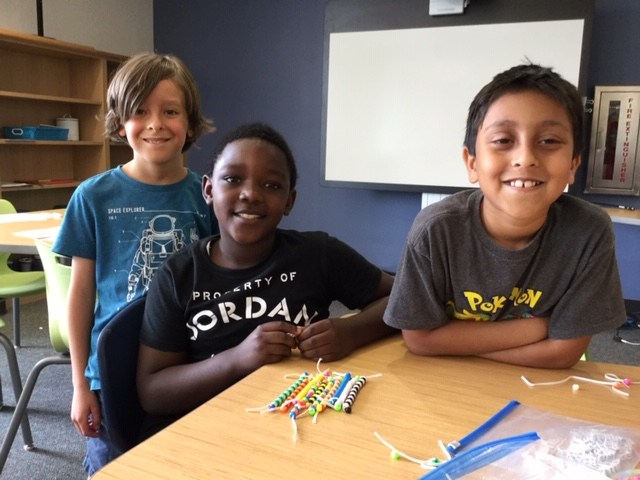iTeach Leader Sparks Creativity and Innovation Through Genius Hour

During the Genius hour, which takes place over the spring, K-12 students are given
the a wealth of resources to create projects of their own. Photo credit: Photo Courtesy
of Mindy Bell
KENNESAW, Ga. (Nov 14, 2018) — A Kennesaw State iTeach member is working with local schools to implement Genius Hour, a new initiative meant to help K-12 students explore their passions.
iTeach Project Leader Leigh Martin is working alongside Vickery Mill Elementary Media Specialist Mandy Bell to implement the new initiative.
“We’re getting students to start thinking about things that they love and giving them the opportunity to play around with that,” Bell said.
The initiative was brought about by a collaboration between local teachers and KSU’s iTeach, a program within the Bagwell College of Education that works to improve teaching and learning styles in classrooms across Georgia.
Genius Hour takes place during the spring, and for one hour each week, a series of topics ranging from kindness to the environment are discussed with the students. After these topics are discussed, the students are given an abundance of different resources to use in creating projects of their own.
“We try to widen their horizons because younger students have limited life experiences, so we try and show them something that they could be interested in,” Bell said. “We hope that when we show them some of these things that this will spark an interest.”
Martin and Bell said that students were introduced to ideas such as pollution through PowerPoints showing what polluted oceans look like. They also taught students ways that they can help reduce pollution and other environmental issues.
“We try to get them to come up with something to do based on their interests or what they saw and then come up with a proposal,” Bell said. “So they might not have had a passion when they started but we’re hoping to plant that seed.”
Martin said that kids who at first had no idea how to start creating their own work soon began knitting, creating drawings and sculptures with a 3D printer pen and building with cardboard boxes.
“We’re having them use those critical thinking skills and creativity at school but for doing something outside of the curriculum standards, so it is really powerful,” Martin said.
Bell and Martin said that the biggest challenge they face is getting students to become interested in subjects other than the technology that they are already exposed to such as video games and YouTube.
“Students want consumption, they want to be entertained,” Martin said. “We want them to create something, so it’s a battle between creation and consumption. We have to keep talking to them and say, ‘We know that you like to play Fortnite, but we want you to make your own game like the people who built Fortnite did.'”
The national Genius Hour movement was inspired by Google, which gave its employees 20 percent of their time to work on any project that interested them. This time increased productivity within the company and birthed many innovations such as Gmail and Google News.
“It’s becoming clear that kids need critical thinking and to be able to communicate and collaborate with others in order to work in the real world,” Martin said. “They have to be able to explore, so schools all over are doing things such as Genius Hour with labs and maker spaces, things that really encourage kids to think and learn without just memorizing content.”
Many educators, parents and students criticize the test preparation infrastructure of schools, perceiving the testing as being stressful and often express concerns on the impact of testing on students’ physical and emotional well-being, engagement in school and self-efficacy, according to a Harvard study.
“If we teach children everything we know, their knowledge is limited to ours. If we teach children to think, their knowledge is limitless. Our ability to succeed in life is directly proportional to our ability to solve the problems we encounter along life’s journey,” the Critical Thinking Co. wrote on their website.
“Tragically, elementary and secondary education is mostly memorization,” it continued. “The biggest problem facing educators today is the inability of most students to think analytically.”
Bell and Martin said that they also work with local teachers by involving them in Genius Hour so that they will be able to incorporate it into their future students’ education as well.
A free webinar is provided online for teachers on how to begin implementing Genius Hour in the classroom.
“It’s about planting a seed,” Bell said. “Hopefully in five or ten years, some kids might think, ‘Wow, I remember in elementary school doing Genius Hour and being given the opportunity to explore fashion designing.’ It might become a career that started when they were given that opportunity.”
The Sentinel
Nov 12, 2018
















